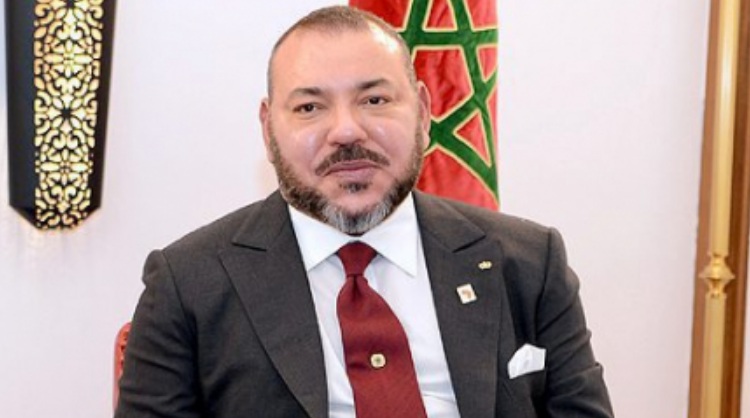The Diplomat
King Mohamed VI sent yesterday a message of congratulations to King Felipe VI of Spain on the occasion of his birthday and just two days before the start of the High Level Meeting (RAN, for its Spanish acronym) in Rabat, which will stage the “honeymoon” that the two countries are living since the unexpected turnaround of Spain in favor of the “Moroccanness” of Western Sahara. The meeting will bring together a dozen ministers (none of them from Unidas Podemos) and the signing of some twenty bilateral agreements is expected.
In the message, reported by the state news agency MAP, the Alaouite sovereign expresses his “warm congratulations and his sincere wishes of health, happiness and long life to the King of Spain and his illustrious royal family”. Likewise, Mohammed VI reiterates to Felipe VI his “pride in the strong ties of friendship that unite the two sovereigns and the two royal families, underlining his firm determination to continue working alongside the Spanish sovereign to strengthen these ties and raise bilateral cooperation to the level of the aspirations of the two friendly peoples.”
The congratulatory message comes just two days before the celebration of the High Level Meeting between Spain and Morocco, the first in almost eight years, which will take place on February 1 and 2 in Rabat. Felipe VI himself referred last January 25, during the traditional annual reception to the Diplomatic Corps accredited in Spain, to the beginning of “a new stage with Morocco” and the upcoming celebration of the RAN, an appointment “that had not taken place since 2015”, which “is part of the roadmap agreed in April last year and will allow deepening our extensive bilateral relations to work together on more solid foundations”.
The last RAN between Spain and Morocco was held in June 2015 and the next one had been scheduled, in principle, for December 2020, but since then it suffered several postponements because of the COVID-19 pandemic and the very deep diplomatic crisis that erupted in April 2021 following Spain’s decision to host in a hospital in Logroño the leader of the Polisario Front, Brahim Ghali, on humanitarian grounds.
The turning point came in March 2022, with the Spanish government’s decision to accept the Moroccan autonomy plan for Western Sahara as “the most serious and realistic basis” for a solution to the conflict. As a consequence of this “thaw” (one of the consequences of which has been the serious diplomatic crisis with Algeria, Spain’s main gas supplier), President Pedro Sanchez and King Mohamed VI adopted, on April 7 in Rabat, a bilateral roadmap that laid the foundations for the recovery of diplomatic relations and paved the way for the holding of the High Level Meeting.
Presences and absences
Apart from Pedro Sánchez and the Moroccan Prime Minister, Aziz Ajanuch, the RAN in Rabat will be attended by a dozen ministers of the Spanish government and their corresponding Moroccan counterparts. According to government sources, the meeting will be attended by the first and third vice-presidents, Nadia Calviño and Teresa Ribera; and the ministers of Foreign Affairs, José Manuel Albares; Interior, Fernando Grande-Marlaska, Justice, Pilar Llop; Transport, Raquel Sánchez; Education, Pilar Alegría; Industry, Trade and Tourism, Reyes Maroto; Agriculture and Fisheries, Luis Planas; Culture and Sport, Miquel Iceta; Science and Innovation, Diana Morant, and Inclusion, Social Security and Migration, José Luis Escrivá.
According to the same sources, the Spanish ministers and their Moroccan counterparts will sign some twenty bilateral agreements. They will also address issues of great relevance in bilateral relations, such as trade, migration, security and even the possible opening of an Instituto Cervantes in El Aaiun, capital of Western Sahara. Apart from that, the RAN will make it possible to analyze the results of the “pilot test” carried out last week for the commercial opening of customs with Morocco, the first step towards the reestablishment of customs controls in Melilla, paralyzed since October 2018, and the establishment of a new customs office in Ceuta, which currently does not exist. As reported by the Ministry of Foreign Affairs, this test will serve as a basis for designing “a timetable that will allow trade between the two countries with all the guarantees” and to address “the needs in terms of infrastructure, for the implementation of controls and for the deployment of the necessary staff with which to provide a response to the users of this customs”.
Those who will not go to Rabat will be the second vice-president and minister of Labor, Yolanda Díaz; the minister of Social Rights and leader of Podemos, Ione Belarra; and the head of Consumption and federal coordinator of IU, Alberto Garzón. Unidas Podemos, a minority partner in the coalition government, has repeatedly criticized Pedro Sanchez’s decision to recognize the Moroccan autonomy plan for Western Sahara. Several members of Podemos and Izquierda Unida participated in the recent congress of the Polisario Front in the refugee camps of Tindouf (Algeria), in which Brahim Ghali was re-elected as secretary general. The opposition parties and the partners of the Government asked Pedro Sánchez last week to inform the Parliament about the Spanish-Moroccan Summit before the beginning of it, something that, evidently, is not going to be possible.
Prior to the RAN, a business forum will be held tomorrow in Rabat, chaired by Pedro Sánchez and Aziz Ajanuch, with the participation of the President of the General Confederation of Moroccan Enterprises (CGEM), Chakib Alj; the President of the Spanish Confederation of Business Organizations (CEOE), Antonio Garamendi; the Spanish Minister of Industry, Trade and Tourism, Reyes Maroto; and the Moroccan Minister of Economy and Finance, Nadia Fettah. The meeting, which will be devoted mainly to cooperation between Spanish and Moroccan companies and the energy transition, will be closed by the two heads of government.
For his part, José Manuel Albares said yesterday, during an event organized by the Club Siglo XXI, that Ceuta and Melilla “are Spanish, period”, and therefore it is not necessary that Morocco certify it during the RAN, because “I do not have to certify any country the Spanishness of Ceuta and Melilla or Valladolid, Barcelona or Santiago de Compostela”. Likewise, he affirmed that the objective of the summit is to establish the bilateral relationship “on much more solid bases” and to “avoid those crises that Spain and Morocco seemed to have every six years”.
European Parliament and Cembrero
The High Level Meeting also takes place after a very significant episode of the leaden feet with which the Spanish Government has decided to act in all matters relating to Rabat. Specifically, the Spanish Socialist MEPs recently voted in the European Parliament against a resolution critical of the human rights situation in Morocco. The PSOE justified its decision in the name of “responsibility and in favor of frank bilateral relations based on dialogue and understanding” and Sánchez limited himself to clarifying that his party did not share “some elements” of the resolution and to insisting on the need to improve relations with Morocco.
Likewise, several parties of the parliamentary arc, from PP to EH Bildu, have been interested in the General Courts or in the European Parliament in the “judicial harassment” of Ignacio Cembrero, journalist of El Confidencial. In April 2022, Rabat filed a civil lawsuit against Cembrero after he published that the Government of Morocco could be involved in spying on the cell phones of several Spanish leaders (among them, the President of the Government, Pedro Sanchez, the Minister of Agriculture and former ambassador in Rabat, Luis Planas; the former Minister of Foreign Affairs, Arancha González Laya; and the Minister of Defense, Margarita Robles), and even his own personal cell phone, through the Pegasus program, a “hot potato” that the Spanish government has also done everything possible to get rid of in order not to anger Rabat. To date, the only response of the Executive to this Moroccan demand is that “the Government respects the independence of judicial proceedings”.






